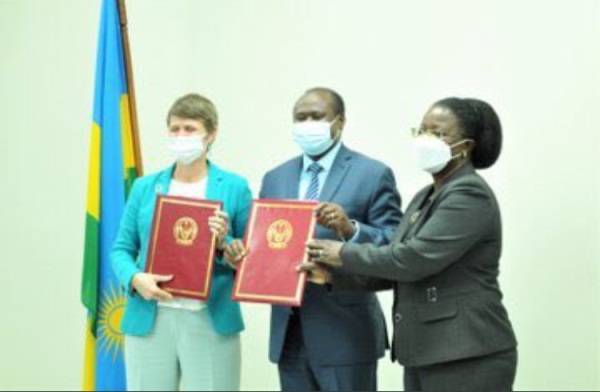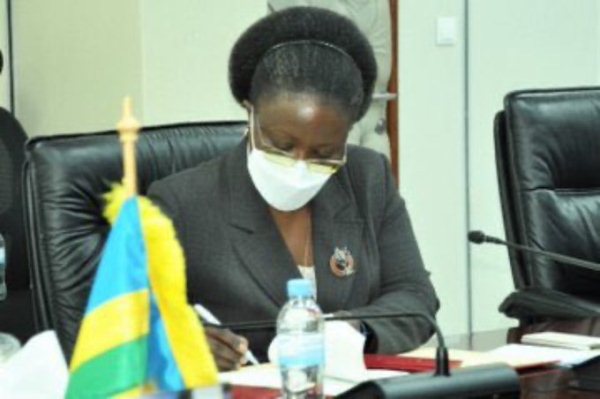

Rwanda’s Minister of Environment, Jeanne d’Arc Mujawamariya
The Government of Rwanda and the Swedish Government have signed a partnership agreement to build resilience of communities living in Rwanda’s Eastern Province to the impacts of climate change. The new partnership will support a project that will reduce vulnerability to climate change through community-based biodiversity restoration and conservation.
The project, known as COMBIO, is a joint effort led by the Ministry of Environment with implementation support from the Rwanda Forestry Authority, the International Union for the Conservation of Nature (IUCN) and Enabel, the Belgian Development Agency, institutions that implement the Transforming Eastern Province Through Adaptation (TREPA) Project to build synergy impact.
“We can only achieve our Vision 2050 goal of being carbon neutral and climate resilient if communities have the knowledge, skills and tools to adapt to a changing climate. This new initiative will not only restore and promote biodiversity in Rwanda’s Eastern Province, but also provide incentives for farmers to be part of the solution by harnessing the power of nature. We are grateful for the support of Swedish government and other partners, and look forward to working with communities in areas of intervention impacted by climate change such as droughts, to make the project a success,” said Rwanda’s Minister of Environment, Jeanne d’Arc Mujawamariya.

Ambassador of Sweden to Rwanda, Johanna Teague with Rwanda’Minister of finance, Dr. Uzziel Ndagijimana and Environment, Jeanne d’Arc Mujawamariya
The project aims to restore and sustain the biodiversity in protected natural forests and establish new biodiversity sanctuaries. It will also integrate diverse native species into productive crop lands and forests to enhance ecosystem’s biodiversity. It will also support farmer’s to develop viable nature-based value chains and enterprises, and establish community-based payment for ecosystem services to reward farmers for promoting biodiversity and native species on their lands. The unique and innovative initiative will also mainstream biodiversity conservation in institutional and community development strategies, programmes and action plans.
“This collaboration has high potential with its focus on biodiversity and climate change. I am pleased to enter unchartered terrain with key partners, not least to explore long term financing solutions for biodiversity and strengthening of livelihoods of local communities together. The initiative builds on a local knowledge base and aims to benefit people living in the Eastern Province, and set standards on national level,” said the Ambassador of Sweden to Rwanda,
Johanna Teague.
The 8,723,277.90 Euros project including 10.8% of co-finance by the implementing partner. The project will be implemented in the districts of Kayonza, Nyagatare, Gatsibo, Kirehe, Ngoma, Bugesera and Rwamagana of whole Eastern Province. The project will be implemented in for six years from December 2021 to December 2027. (End).
